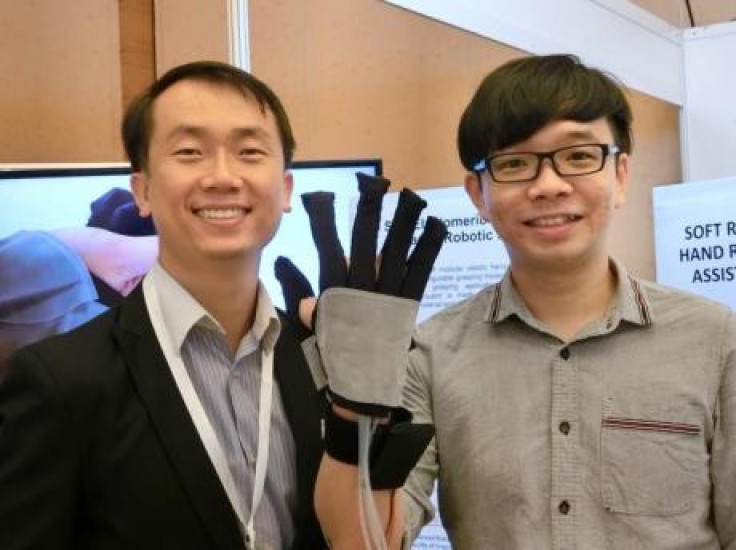Singapore research team develops robotic glove to help those who have lost hand functions

A smart robotic glove for those who have lost hand functions due to injuries or nerve-related conditions has been developed by a four-member team from the National University of Singapore.
Made of lycra, spandex and silicon rubber, the EsoGlove, which took two years to develop, can be washed and reduces discomfort and the risk of injury. Existing hard robotic hand rehabilitation devices have rigid linkages and can only move in one plane of motion.
The glove uses an intuitive system which detects the user's muscle signals using a forearm controller to guide the person to perform the proposed task. A radio-frequency identification or RFID reader on the glove can also be used to scan tags that correspond to a particular motion like pinching or grasping an object.
These tags can be then be placed on the objects, making it easier for the users to link these actions to the objects when they are at home. They have to then tap the reader on the tag and the glove will gradually guide the user's hand movements.
A member of the research team, Assistant Professor Raye Yeow from the Department of Biomedical Engineering said: "The patient can wear it by the bedside, then the device can help them move their hands through a customised therapy session without the therapist having to be there."
He continued: "The other way is for the patients to bring it home, and this device can give them a more intuitive control of objects within their home environment. In the long run, we expect patients to have an improved range of motion, because this device will automatically move their hand into the desired therapy exercises."
The researchers hope EsoGlove will help to stimulate the brain's neural activity in stroke patients to help them regain some control of their affected hand. The EsoGlove will be tested and evaluated in a pilot clinical trial involving 30 stroke patients at the National University Hospital over a period of six months from February.
Dr Yeow hopes to price the smart glove at only 10% of existing hard robotic hand rehabilitation devices which cost between $20,000 (£13,751) to $30,000 (£20,626) . According to the World Stroke Organisation, about 15 million people worldwide suffer a stroke, which often leads to an impairment in hand functions.
The team, which includes Dr Lim Jeong Hoon from the Department of Medicine, PHD candidate Yap Hong Kai and undergraduate student Benjamin Ang Wee Keong, will be filing for a patent They hope to start a company to commercialise the device, Science Daily reported.
© Copyright IBTimes 2024. All rights reserved.






